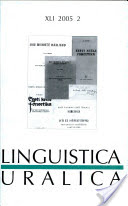The Early History of Estonian Speech Prosody Studies
The Early History of Estonian Speech Prosody Studies
Author(s): Taive SärgSubject(s): Language and Literature Studies
Published by: Teaduste Akadeemia Kirjastus
Keywords: Estonian; prosody; word stress; word quantity
Summary/Abstract: The paper provides an overview of research on Estonian speech prosody from the 17th century to the beginning of the 19th century, focusing on the discovery of three levels of word stress and quantity. The priests of mainly German origin founded Estonian linguistic tradition. The lexical stress on the first syllable was probably known before it was first mentioned in the grammar (Stahlen 1637); the existence of secondary stress was clearly stated by J. J. A. Hirschhausen (1827). Till the 19th century it was difficult to realize that the duration was not a correlate of stress in Estonian. The Estonians' perception was of utmost importance in discovering the three quantity degrees, as the (supposed) first recording of three quantities in vowels ("Agenda Parva" 1622 by unknown author, presumably of South-Estonian origin) as well as their theoretical description (Masing 1824) were given by native speakers.
Journal: Linguistica Uralica
- Issue Year: XLI/2005
- Issue No: 2
- Page Range: 81-90
- Page Count: 10
- Language: English

